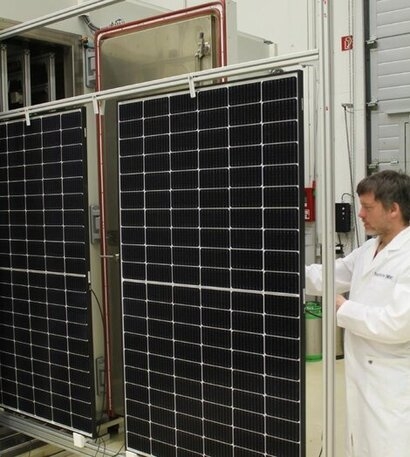
All of the IBC Solar modules selected by Fraunhofer CSP are characterised by very low degradation and completed the test procedure with excellent results. The modules received a quality certificate for excellent LeTID stability.
LeTID is triggered by excess charge carriers caused either by illumination or by electric current at temperatures above 50°C. In susceptible modules, this leads to a power loss of up to 10 percent, affecting PERC solar cells in particular. At the Fraunhofer Centre, this susceptibility to degradation has been intensively researched in recent years.
For the current investigation, Fraunhofer CSP randomly selected four PERC modules each from IBC Solar's own brand. In the course of the test, the modules were exposed to different conditions and temperatures in a climate chamber over a longer period of time. In order to simulate the most realistic environmental conditions possible for the continuous use of PERC modules, the module temperature must be at least 75°C and the humidity must be 10 percent, while the modules are subjected to a defined current flow. The minimum test time is 324 hours (approximately 2 weeks). IBC Solar's PERC modules withstood the extreme conditions and performed with a particularly low power loss. This result proves the very low degradation that IBC Solar's own brand modules exhibit over their entire lifetime.
“We are very pleased with this excellent result” said Stefan Horstmann, COO of IBC Solar AG. “Quality is more than just a promise for us. The outstanding performance of our modules not only reflects our corporate philosophy, but also proves that our extensive quality assurance measures for our own brands are paying off.”
The globally valid test specification IEC TS 63342, which IBC Solar was involved in developing at an early stage, serves as the basis for the test. The main concern of all those involved was and is to ensure long-term quality standards in the photovoltaic sector.
For additional information:

